Everyone wants to go camping, but some people are reluctant about it because there won’t be power at camp to charge their phones and devices. If you want to stay connected while camping, you might need an extra source of power, such as a generator.
However, generators can get stolen. So, how can you secure your generator while camping?
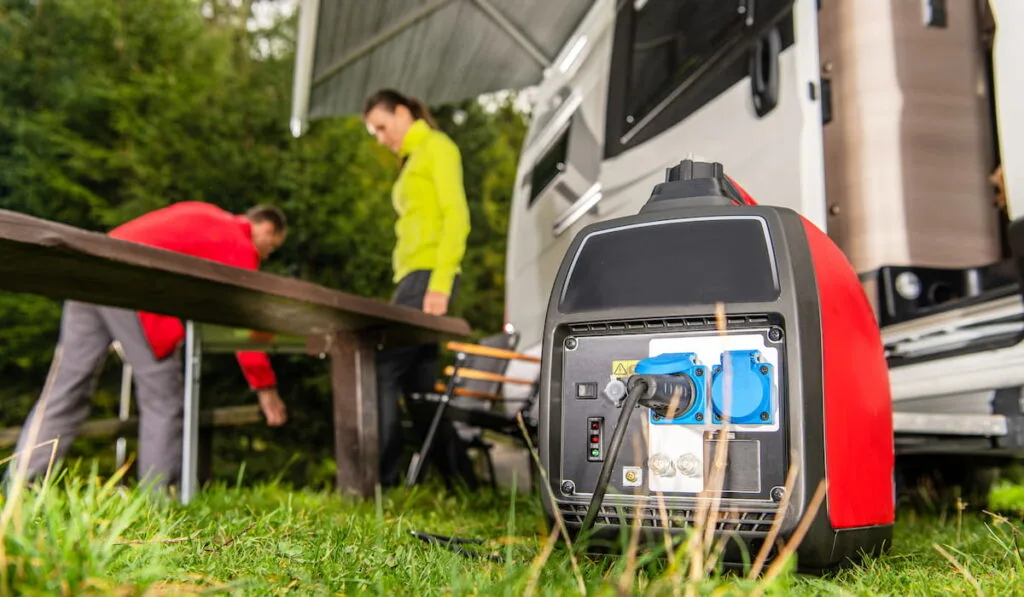
Table of Contents
How to Secure a Generator While Camping
Here are some ways to secure your generator:
1. Lock The Generator with a Cable or Chain
The easiest way to secure your generator when camping is to use a cable or chain to lock it to a firm and heavy object.
For example, you can chain the generator to your RV or car. If the chain is long enough, you can wrap it around a large, nearby tree.
You want to make sure that you use a quality chain or cable so that thieves cannot easily break or cut it. Remember to examine the chain or cable to make sure that it does not have any weak or broken parts.
2. Keep the Generator Close to Camp
Generators can be noisy, but their sound can be a type of notification for you.
For example, the sound of a generator lessens the further away it is. This is why you need to keep the generator close to your camp (i.e., your tent) so that you can use its sound to monitor it.
You shouldn’t worry that the sound will disturb you or others in the camp. You brought it to handle your power needs. If the generator is not faulty, it should not be too noisy, no matter where you are camping, as the density of the woods can reduce the sound.
3. Keep the Generator Inside When Not in Use
Now, you do not want to leave an unsecured generator outside when not in use. You should keep the generator outside when in use because of the exhaust it produces, and you can monitor it through its sound.
However, you need to bring it back inside so that thieves and others will not have access to it while you sleep.
Remember that generators can be very hot, so you want to take note of the temperature of your generator before you bring it in. Wait until it cools a little before you take it inside.
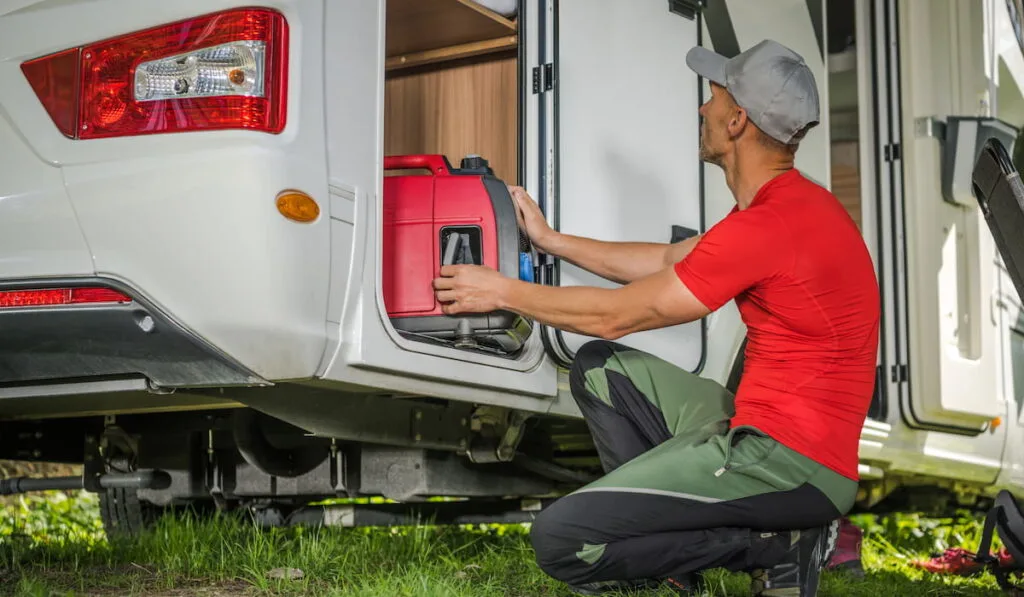
You can leave it in front of your tent or RV for 30 minutes or more before you take it inside. Also, be mindful of the location where you keep the generator.
4. Install a GPS Tracker
A GPS tracker may not prevent thieves from stealing your generator, but it can surely help you to get it back if it’s stolen.
You can install a GPS tracker on the generator frame or under it so that people cannot easily see it.
You want to go for GPS trackers that can withstand high temperatures.
There are so many types of GPS trackers that you can get from a hardware shop or any similar store. You should go for those that you can link to your phone for easy access.
Please note that if your generator is missing, you should inform the local authorities (if any) for your own safety, and do not just rely on the tracker alone.
5. Use Security Brackets and an Alarm System
A security bracket is a metal bracket you can bolt to the generator to provide a firmer handle to attach a chain. You can easily buy security brackets for your generator from any hardware shop.
You could add a security alarm system to the brackets so that you can easily secure the generator. And with an alarm system, you don’t have to keep the generator inside the tent.
For example, the TattleTail security system has a motion sensor that can alarm you through your phone when it senses motion. Other security alarm systems can make sounds when they register motion.
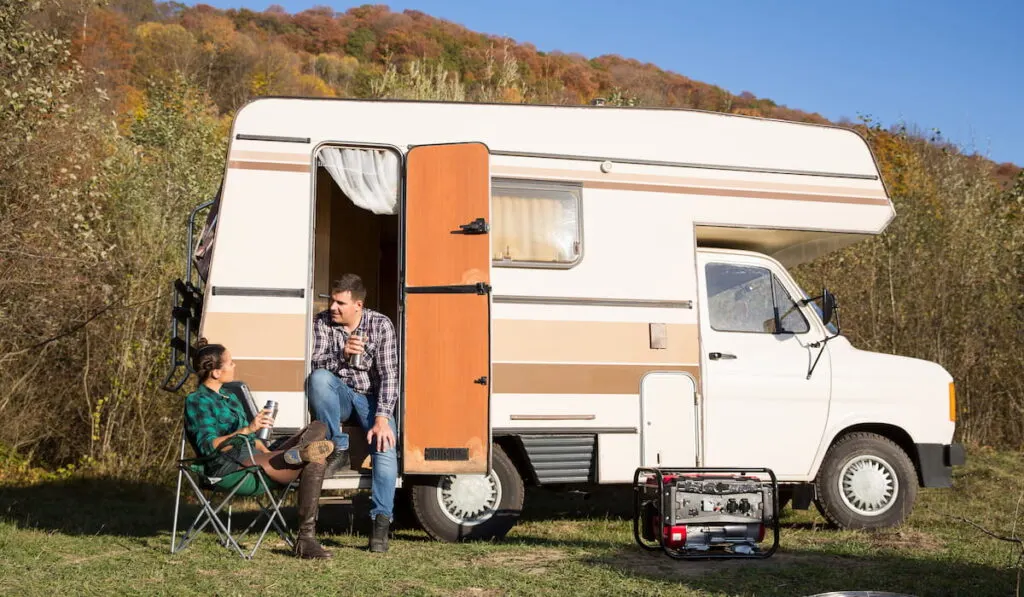
6. Camp in a Secure Location
Take note of the following:
- Thieves do not only steal generators: If you are camping at a spot with thieves, don’t expect only your generator to go missing. Other valuable items can get stolen, so you need to think of ways to secure them.
- Your security should always come first: It does not matter where you go camping; you need to think about safety first. How can you be safe in a camp to which thieves have access?
As you can see, you need to select the right camping location. This is not just about your generator, but also about other devices as well as the safety of you and your friends or family.
Congrats, as you now know how you can secure your generator! Continue reading to learn how you should handle your generator while in camp.
Generator Handling Methods and Care Tips for You
Here are some generator care tips for you while in camp:
1. Where the Exhaust Faces
You need to position your generator so that the exhaust faces out of the camp.
Do not let the exhaust face the camp because it expels toxic gases (for example, hydrogen monoxide) that can kill you and others in the camp and contaminate food.
Most of these gases are odorless, so you may not know when you are breathing them.
2. Keep Your Generator On Level Ground
Even though you are outside, you want to make sure that you keep your generator on level ground. This is because a generator cannot properly make use of its gas or oil when it is slanted.
To avoid future problems with your generator, you want to keep it on level ground.
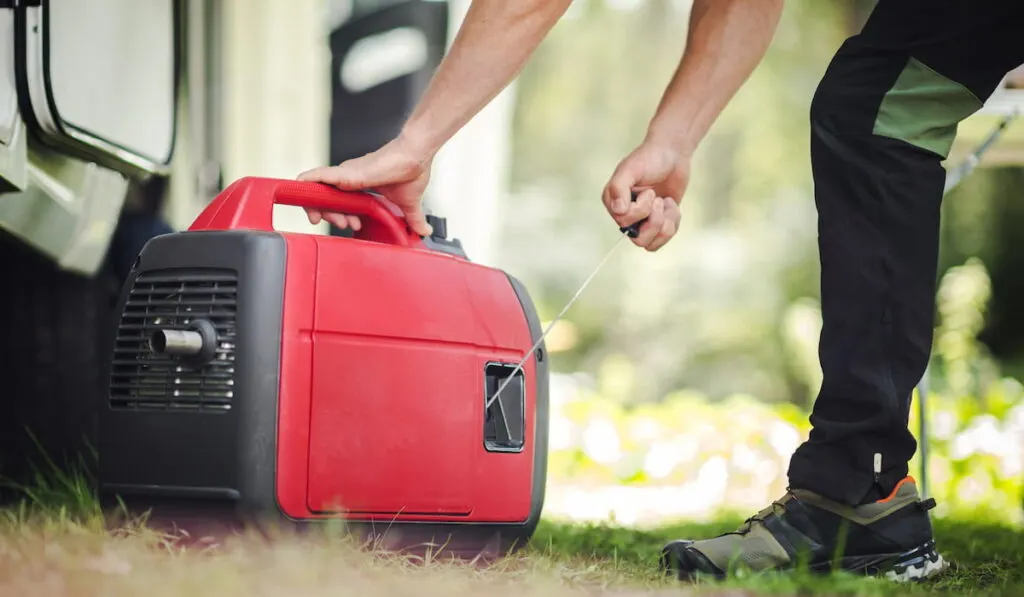
3. Use a Generator Large Enough for You and Your Family
You want to remember that you are camping with others, so when you turn on the generator, a lot of people will come to charge their electronics and devices. If the generator is not big enough to carry all the load, device harm can result.
Consider the total load your friends or family will put on the generator when choosing the best generator for the trip.
4. Cover the Generator When You Aren’t Using It
You are outside, so your generator can be exposed to various environmental factors such as rain, high sunlight, snow, etc.
To keep your generator from developing faults, please get a cover so that it stays free from environmental factors.
If you cannot make and carry a metal cage for the generator (which can be an extra source of security), you can look for any flat object, such as a tarp, to cover the generator. Just make sure that the object that you choose is effective in covering essential parts of your generator.
5. Do Not Forget to Buy Enough Gas, Engine Oil, and Spark Plugs
Many people have traveled with their generators but forgot to bring gas as well as other essentials along. Your generator is a waste without fuel, so you want to make sure that you buy enough gas that will last the entire camping trip.
Also, buy extra oil in case you need to change the oil in the generator. Sometimes generator problems are caused by a bad spark plug, so you could bring a spare spark plug or two as a backup.
What if you do not want to use a generator? Continue reading for some alternatives power sources.
Alternatives to Using Generators in Camp
Generators are usually too noticeable because they are large. Also, everyone (even people far from the camp) will surely know that there is a generator in your camp when you turn it on.
This is why bringing a generator to camp may be a bad idea as it can attract thieves and others.
To help you to stay connected with your phone, laptop, and other devices, you surely need a source of power. Any portable source of power that can replace your generator is just fine.
Here are some alternatives to using generators in a camp:
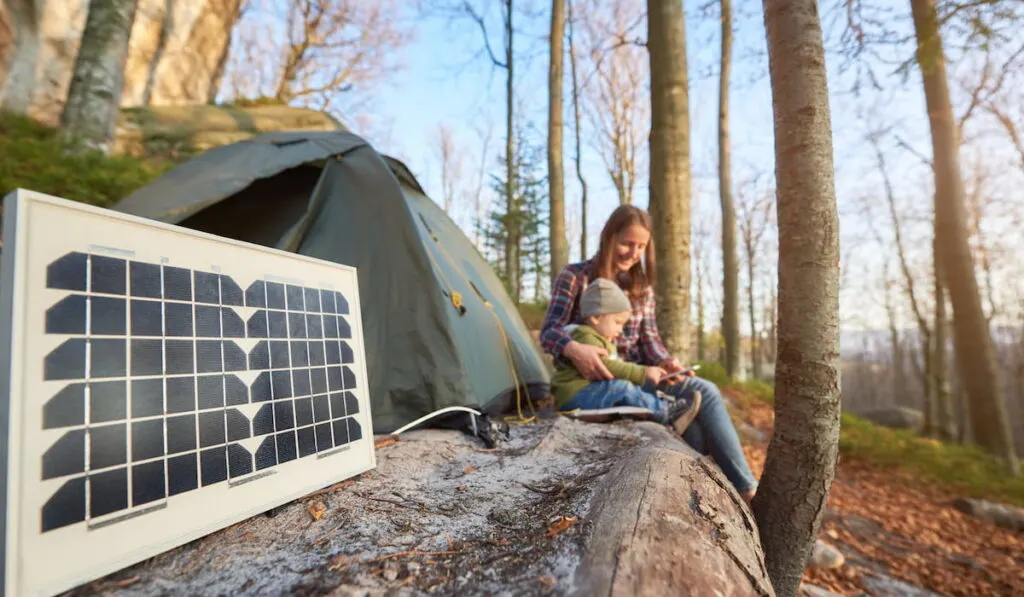
1. Solar Panels
Generators are usually too noticeable, so you want to go for something that works silently. You can keep solar panels on your RV or in the middle of the camp (in front of your tent) for safety.
On top of the RV, people may not notice the panels. In the middle of the camp, people will notice when someone is approaching the panels.
But there are also many techniques to protect your solar panels from thieves.
Remember that solar panels may not work as fast as your generators while charging your devices, so you want to reduce the number of phones, laptops, and other rechargeable devices that you are charging at a time.
2. Solar-Powered Electronics
Instead of buying an extra source of power, such as generators and solar panels, which can be too expensive, what if you buy solar-powered electronics?
There are many portable lamps as well as fans that you can charge using the sun. There are some power banks as well.
These electronics are durable because they are charged with a stable source of power, so you can use them for a very long time. Also, they are cheap when you consider the amount of money that you spend on generators, gas, and other items.
Why not bring some when going camping?
3. Power Banks
If you are not camping for a very long time, you can go with a fully charged power bank or any phone-charging device so that you can stay connected. These devices are very portable, so you can take them anywhere, and you will not feel their weight at all.
Note that when your power bank gets a low battery, you will need to charge it with another source of power.
However, there are some solar-powered power banks. Also, note that you will need a generator or another good source of power if you will actively use your laptop while in camp.
Now you are ready for your camping trip, right?
Final Thoughts
You can enjoy your camping trip by staying connected with the world. All you need is a source of power, such as a generator, to charge your phones and laptops. You can even enjoy the cool breeze at night with the help of your fans powered by the generator.
Instead of worrying that thieves will steal your generator, make use of the tips in this article to keep your generator safe.
Resources
- https://easyoutdoorlife.com/how-to-secure-your-generator-while-camping-with-rv/
- https://www.forestriverforums.com/forums/f5/ways-to-deter-generator-theft
- https://lifeonroute.com/secure-rv-generator
- https://thrivingoutdoors.com/how-to-secure-a-generator-while-camping/#Bolt_it_to_a_Bracket
- https://generaytor.com/how-to-secure-a-generator-outside/#Security_Bracket
